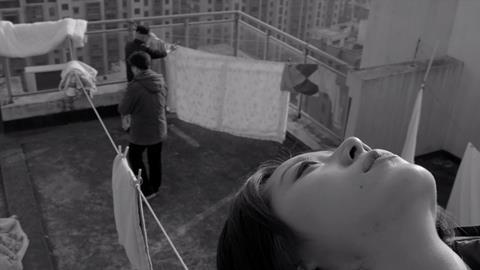Noteworthy debut from this female director marks a new voice in Chinese cinema

Dir. Zheng Lu Xinyuan. Hong Kong/China. 2020. 101 mins
Returning to her home town of Hangzhou for the New Year celebrations, 22 year-old Muzi (Jin Jing) struggles to find her place in a city she barely recognises. Her parents are long separated, her childhood apartment lies vacant, the geography of the city is torn up and rewritten around her. Her way of navigating the familiar and the unfamiliar is to create a visual diary – fragments of memories, encounters with strangers and old friends, moments of privacy. Weaving together the shifting perspectives of Muzi’s phone footage and a more distant, observational lens, the feature debut from Zheng Lu Xinyuan is a beguiling, shape-shifting collage-style portrait of a young woman exploring her space in the world.
Its sparky energy could recommend this to younger arthouse audiences
Fresh, candid and strikingly intimate, this hybrid between documentary and fiction featuring non-professional actors represents a bold and unconventional female voice from China. Further festival slots are a given, and the picture could prove to be attractive to distributors with interests skewed towards the more experimental end of the art cinema spectrum. But although the picture is formally daring, it is by no means inaccessible and its sparky energy could recommend this to younger arthouse audiences. It’s hard to imagine that the picture will be widely seen domestically, given its small size and scope. Whether or not it’s successful at home, though, it certainly marks Zheng Lu Xinyuan as a notable talent to watch.
The Cloud In Her Room is visually arresting throughout, but there’s a particularly evocative shot early on in the picture. Newly arrived into town, Muzi has gravitated towards the empty flat where she once grew up. She curls up, folding herself to slot into an empty alcove in the living room, but her unwieldy boots dangle out. And in a way, this sets the tone for her whole visit – she spends a lot of time not quite fitting into the spaces that used to be hers to fill. Staying with her father (Ye Hongming), his new wife (Liang Cuishan) and their daughter, she is a benevolent stranger to the child, who hasn’t yet been told that she has an older half sister. To her father, she is still a child to be chastised for coming home late. And to her mother (Lui Dan), she is a drinking partner and confidante. With her visiting boyfriend Yu Fei (Chen Zhou), her status is still to be decided. “I don’t think I will fall in love again,” he tells her. “Once was enough.”
Music is used sporadically, but much of the heavy lifting is done with sound design, capturing the perpetual rumble of construction and destruction in the streets outside the window. The editing is equally sharp. Jump cuts flick through half remembered conversations, skipping over the painful bits perhaps, or just needling around the key events. At other times, the striking black and white photography is more pensive and preoccupied, unfolding in longer, languid takes, reflecting Muzi’s mercurial moods as she reconnects with her home. These connections include sexual ones, unaffected and intimate, with instances of both male and female full frontal nudity, straight and gay.
Production company: Blackfin Production, Nina Xiao
International Sales: Rediance www.rediancefilms.com
Producer: Wang Zijian
Screenplay: Zheng Lu Xinyuan
Editing: Zheng Lu Xinyuan, Lui Xinzhu
Cinematography: Matthias Delvaux
Music: Tseng Yun-fang
Main cast: Jin Jing, Liu Dan, Chen Zhou, Ye Hongming, Dong Kangning, Liang Cuishan















![[L-R]: Amanda Villavieja, Laia Casanovas, Yasmina Praderas](https://d1nslcd7m2225b.cloudfront.net/Pictures/274x183/6/4/1/1471641_pxl_20251224_103354743_618426_crop.jpg)








